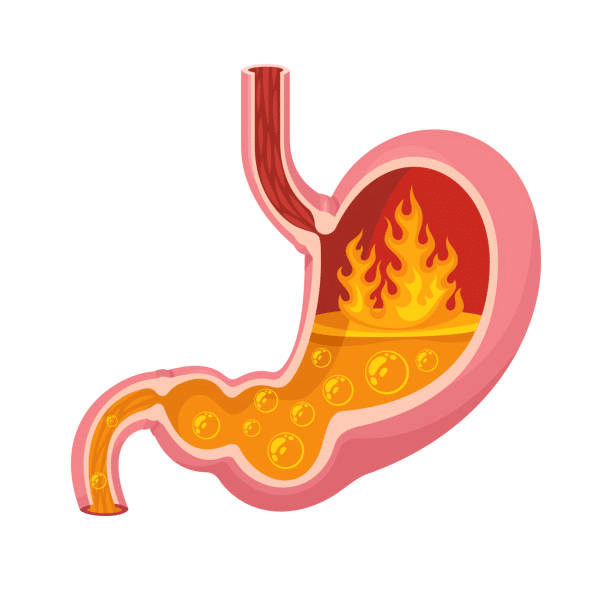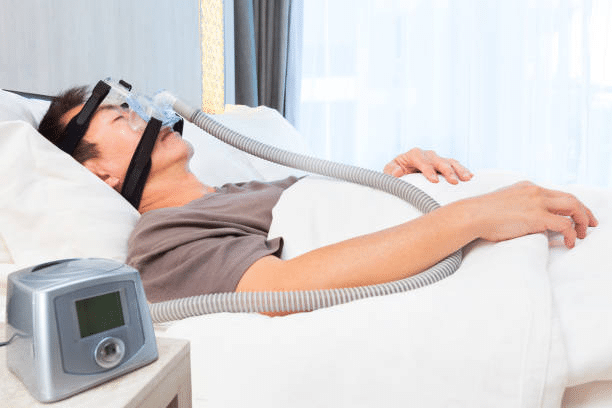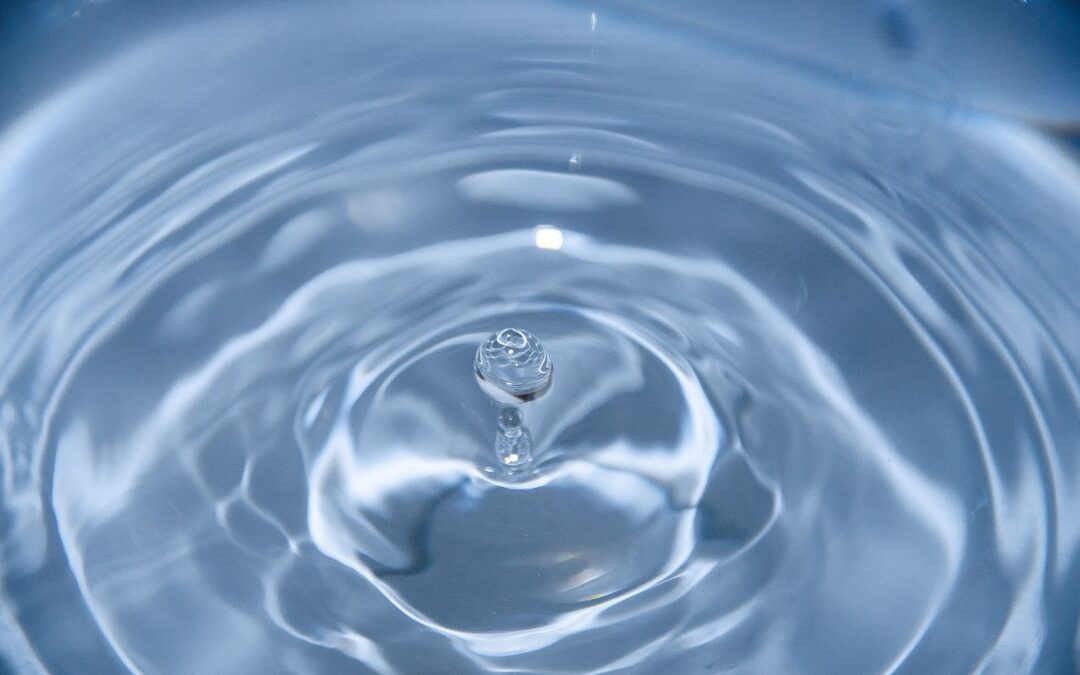Patients with sleep apnea often get treatment with continuous positive airway pressure (CPAP) machines. It entails using a device continuously blowing air into a mask worn over the nose and/or mouth. CPAP treatment is well-known for treating obstructive sleep apnea, but more recent research suggests it may also help treat gastroesophageal reflux disease (GERD) symptoms.
This article will examine the connection between CPAP treatment and GERD and what you should know if you use it to treat your sleep issue and GERD symptoms. Also, we’ll provide some advice on how to lessen GERD symptoms while undergoing CPAP treatment.
What Is GERD?

The lower esophageal sphincter (LES), a ring of muscle that divides the esophagus from the stomach, is impacted by gastro esophageal reflux disease (GERD), a chronic digestive ailment. When the LES doesn’t function correctly in GERD patients, stomach acid and other digestive fluids might flow back into the esophagus. Many unpleasant symptoms may result, such as heartburn, acid regurgitation, chest discomfort, and sore throat.
Being overweight, smoking, and certain medical disorders, including hiatal hernias, are just a few of the numerous things that may cause GERD to develop.
Moreover, GERD may be more likely to develop in those with untreated sleep apnea, a common sleep disease marked by bouts of disrupted breathing while asleep. Because of the increased pressure on the LES, research has shown that obstructive sleep apnea may cause nocturnal gastroesophageal reflux disease and other nighttime GERD symptoms.
Diagnosing and Treating GERD
Your doctor will typically do a physical examination, examine your symptoms, and review your medical history to identify GERD. They could also request tests like an upper endoscopy, in which a tiny camera is inserted into your mouth and used to see your esophagus, or a pH monitoring test, which gauges how much acid is present in your esophagus over a day.
Modifying one’s lifestyle, using drugs, and even having surgery are all possible treatments for GERD. Weight reduction, avoiding trigger foods, and eating smaller, more often meals may all help lessen GERD symptoms. Antacids, proton pump inhibitors, and H2 receptor blockers are some medications that help acid reflux reduction. When people with severe GERD symptoms that don’t get better with standard treatment, they may need surgery to strengthen the LES.
Talking with your healthcare professional about treatment choices is crucial if you have sleep apnea and nighttime GERD symptoms. It has been shown that the symptoms of sleep apnea may be improved, and the frequency of nocturnal GERD symptoms can be decreased using CPAP therapy, a standard sleep apnea treatment that includes putting a mask over your nose or mouth to produce continuous positive airway pressure. In fact, recent research in the Journal of Clinical Sleep Medicine demonstrated that in sleep apnea patients with nocturnal GERD, CPAP treatment substantially reduced heartburn scores and acid regurgitation.
Chronic digestive problems like GERD may result in several unpleasant feelings. Modifying one’s lifestyle, using drugs, and even having surgery are all possible treatments for GERD. Individuals with sleep apnea may be more likely to develop GERD, and CPAP therapy may be a valuable treatment for lowering GERD symptoms at night in sleep apnea sufferers.
The Relationship Between GERD and CPAP Therapy
Obstructive sleep apnea (OSA), defined by frequent breathing pauses while sleeping, is often treated with continuous positive airway pressure (CPAP) therapy. Although CPAP therapy is helpful in treating OSA, evidence indicates that it may worsen or improve GERD symptoms, a prevalent disorder characterized by persistent acid reflux.
Research has shown the nuanced and multifaceted connection between CPAP treatment and GERD. Some experts contend that the increased intra-abdominal pressure brought on by administering positive airway pressure in CPAP treatment may enhance the likelihood of GERD symptoms. Some studies have demonstrated that by minimizing nighttime gastric reflux, CPAP treatment may reduce GERD symptoms.
The lower esophageal sphincter (LES), a muscular ring that divides the esophagus from the stomach, is one theorized mechanism by which CPAP treatment may increase GERD symptoms. The LES generally stops stomach acid from flowing backward into the esophagus. According to studies, CPAP treatment may lower the LES pressure, enabling stomach acid to reflux into the esophagus.
On the other hand, some studies have shown that CPAP treatment may lessen the amount of chronic acid reflux while you sleep, therefore improving the symptoms of GERD. According to research in the Journal of Clinical Sleep Medicine, people with sleep apnea who get CPAP treatment have fewer GERD symptoms at night. According to a further study, CPAP therapy reduces acid regurgitation and heartburn symptoms.
CPAP treatment and GERD have a complicated interaction that depends on several variables. Some research has discovered that CPAP treatment may worsen GERD symptoms, while other studies have found that it might improve them.
It is critical for doctors to keep an eye on GERD symptoms in patients with sleep apnea receiving CPAP therapy and to modify treatment as necessary. Further investigation is required to completely comprehend the processes behind the association between CPAP treatment and GERD.
Does CPAP Therapy Assist With GERD?

According to studies, CPAP treatment helps reduce GERD symptoms in those with OSA. By decreasing the frequency of sleep-disordered breathing episodes that may cause reflux, CPAP treatment may alleviate the symptoms of GERD.
Moreover, CPAP treatment may lessen the amount of acid that can flow back into the esophagus by increasing pressure in the lower esophageal sphincter. This muscle divides the esophagus from the stomach.
Nevertheless, there is conflicting information about how well CPAP treatment treats GERD symptoms in people who do not have OSA. Although some studies have indicated a substantial improvement in GERD symptoms in these individuals with CPAP treatment, others have not. Only people with OSA and GERD may benefit from CPAP treatment for GERD symptoms.
While CPAP treatment often treats OSA, it may also improve GERD symptoms in these patients. If researchers determine that CPAP therapy is an effective treatment for GERD symptoms in individuals without OSA, further research will be necessary.
Managing GERD Symptoms With CPAP Therapy
Sleep apnea, a sleeping disease characterized by frequent breathing pauses, is often treated with CPAP therapy. CPAP treatment is when you sleep with a mask on that blows air into your airway all night long.
Although CPAP treatment is beneficial for treating sleep apnea, some individuals may also have worsening GERD symptoms. When utilizing CPAP treatment, patients may take measures to lessen GERD symptoms.
GERD Symptom Reduction Strategies When Using CPAP Treatment
- Lie on your left side to sleep: Sleeping on your left side helps lessen GERD symptoms at night. Stomach acid may not flow back into the esophagus when you sleep on your left side because your stomach is lower than your esophagus.
- Raise your head high: By keeping stomach acid in the stomach, elevating the head of your bed by 6 to 8 inches will help lessen GERD symptoms. If raising the head of your mattress is not an option, consider elevating your upper body as you sleep using a wedge pillow.
- Eat nothing before bed: A heavy meal just before night might worsen GERD symptoms. To allow your stomach time to digest the meal, try not to eat for at least three hours before bed.
- Keeping trigger foods out: Certain meals might make GERD symptoms worse. Spicy meals, acidic foods, chocolate, coffee, and alcohol are examples of common trigger foods. Stay away from these meals, particularly in the hours before night.
Best Methods for Managing GERD and CPAP Therapy at the Same Time
Cooperate with your medical professional
Working with your healthcare practitioner to create a treatment plan for both disorders is crucial if you have sleep apnea and GERD. To assist you in managing your GERD symptoms, your healthcare professional may suggest certain lifestyle modifications, medicines, or surgical treatments.
Employ a heated humidifier with a CPAP machine
Increasing the moisture in the air you breathe, a heated humidifier may help lessen the symptoms of GERD. Dry air may aggravate throat irritation and GERD symptoms.
Change the CPAP pressure
Your healthcare professional may need to change your CPAP pressure if you have GERD symptoms while undergoing CPAP treatment. The symptoms of GERD may be lessened by lowering the pressure since less air may be driven into the stomach.
Communicating With Your Healthcare Provider Is Important
Contacting your doctor is crucial while treating sleep apnea and GERD. Your medical professional can monitor your symptoms and modify your treatment strategy. When using CPAP treatment, tell your healthcare physician immediately if you notice any new or worsening GERD symptoms.
Although some patients’ GERD symptoms may worsen when using CPAP treatment, there are methods patients may do to lessen GERD symptoms. By implementing these suggestions and collaborating closely with your healthcare physician, you can effectively treat both diseases and improve your sleep health.
Elevate your CPAP experience and manage GERD symptoms more effectively with our specialized accessories. Visit our Resway CPAP Accessories to find the right solutions for a restful and symptom-free night.




